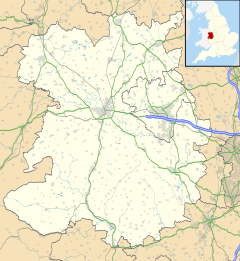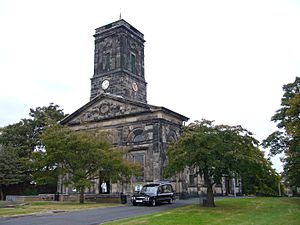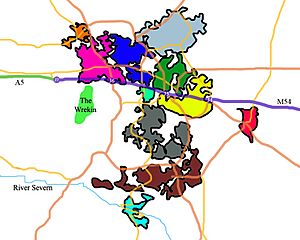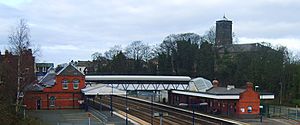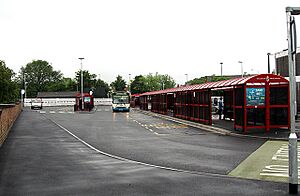Wellington, Shropshire facts for kids
Quick facts for kids Wellington |
|
|---|---|
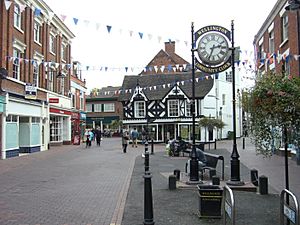 Street view of the pedestrianised centre of Wellington |
|
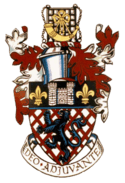 Parish coat of arms |
|
| Population | 25,554 |
| OS grid reference | SJ651115 |
| Civil parish |
|
| Unitary authority | |
| Ceremonial county | |
| Region | |
| Country | England |
| Sovereign state | United Kingdom |
| Post town | TELFORD |
| Postcode district | TF1 |
| Dialling code | 01952 |
| Police | West Mercia |
| Fire | Shropshire |
| Ambulance | West Midlands |
| EU Parliament | West Midlands |
| UK Parliament |
|
Wellington is a lively market town in Shropshire, England. It's part of the wider area called Telford and Wrekin. You can find it about 3 miles north-west of Telford town centre. It's also about 12 miles east of Shrewsbury. The famous hill, The Wrekin, is just 3 miles south-west of Wellington. In 2011, about 25,554 people lived here.
Contents
A Look Back: Wellington's History
Wellington has a very long history. A church has stood here for nearly 1,000 years! A priest was even mentioned in the old Domesday Book. The original churchyard is still there today. The current church, called All Saints, was built in 1789.
Wellington got its first permission to hold a market in 1244. This was given to Giles of Erdington, who owned the land. Guess what? A market still runs in Wellington today! In the past, the market had an open-sided hall. Later, in 1848, a company built a town hall with a covered market space below. This gave traders a permanent place to sell their goods.
Did you know Wellington played a part in the Olympic Games? The first Shropshire Olympian Games were held here in May 1861. These were organized by Dr. William Penny Brookes, who helped bring back the Olympic spirit. In 1868, Wellington even hosted the third National Olympian Games!
Near the town, you can find the site of Apley Castle. This was a strong house from the 1300s. Later, it became stables for a grand house. Today, the old stable block has been turned into apartments. You can still see some parts from the medieval times.
How Telford Was Created
In 1963, the government decided to create a new town called Dawley New Town. Then, in 1968, this new town grew to include Wellington. It was renamed Telford, after the famous engineer Thomas Telford.
The creation of Telford has been a big topic in Wellington. Some people liked the new jobs and money it brought. Others felt it hurt Wellington's own shops and identity. When Telford Town Centre and new shopping areas opened, it affected Wellington's town centre. Even the local football team, Wellington Town, changed its name to Telford United in 1969.
For many years, there were disagreements between Wellington and the local council. But in recent times, the council has invested a lot in Wellington. They built the modern Wellington Civic and Leisure Centre. This building now holds the library, town council offices, a swimming pool, and a gym. It's a great central spot for the community.
Local Businesses
Most of the biggest job providers are in other parts of Telford. But Wellington itself has many small businesses. You'll find hundreds of shops, offices, and small factories here. Many well-known national shops also have branches in Wellington.
Fun Things to Do in Wellington
The Wrekin is one of Shropshire's most famous natural spots. It's part of the beautiful Shropshire Hills Area of Outstanding Natural Beauty. This amazing hill is only about 2.5 miles from Wellington town centre. Thousands of walkers and cyclists visit it every year.
Wellington Market is in the town's old Victorian market hall. It's open four days a week and has over 100 stalls! On the fourth Saturday of each month, a Farmers' Market takes place. Here, you can find local food from Shropshire producers.
Just a short walk from the town centre is Sunnycroft. This is a Victorian house and small estate. The National Trust now owns and looks after it. It's like stepping back in time!
Wellington also has the Belfrey Theatre. This is a theatre run by local volunteers. They put on plays and other shows throughout the year.
Sports in Wellington
The New Buck's Head football stadium is in Wellington. It's the home ground for AFC Telford United. Other sports clubs include the Wellington Cricket Club. They play in a top league called the Birmingham League Premier Division. There's also the Wrekin Golf Club for golf fans.
Exciting Events in Town
Wellington is a busy place with lots of events! Music and theatre groups put on performances all year round. You can also find craft markets at Belmont Hall and Christ Church.
In March, the town celebrates Charter Day. A messenger on horseback delivers the old 1244 charter. Then, a group meets in the Market Square. They choose the town crier, ale taster, and market clerk for the year.
During the summer, there are about 40 events in and around Wellington. These include the Midsummer Fayre, a town carnival, and Lions Day at Bowring Park. The Wellington Walking Festival is also popular. "Sounds in The Square" brings live music to the town centre in July and August.
The Wellington Arts Festival happens every October. It offers many different events. You can enjoy plays, music, art shows, and poetry readings.
Wellington now has its own cinema called The Wellington Orbit. It's in Market Square and run by volunteers. It's the only independent cinema in the Telford area!
Local Media
For local news and TV, people in Wellington watch BBC West Midlands and ITV Central. TV signals come from the Wrekin TV transmitter. Local radio stations include BBC Radio Shropshire and Hits Radio Black Country & Shropshire. The town also has its own local newspaper, the Shropshire Star.
Getting Around: Transport
Wellington has good transport links. It has roads, a central railway station, and a bus station. It's also on routes 45 and 81 of the National Cycle Network, which is great for cyclists.
Train Travel
Wellington railway station is served by three train companies:
- Avanti West Coast has one train to London Euston and back each weekday.
- Transport for Wales runs hourly trains between Birmingham International and West Wales. These trains go to places like Aberystwyth and Holyhead.
- West Midlands Trains also runs hourly trains. These go between Shrewsbury and Birmingham New Street, passing through Wolverhampton.
Train Station History
The train station was built in 1849. In 1867, a new train line opened to connect Wellington with Market Drayton. This line ran for almost 100 years. It closed in 1963. The tracks were removed in 1970.
There were also train lines to Much Wenlock (closed 1962) and Stafford (closed in the late 1960s). A train link for goods only has been reopened to a rail yard at Donnington. People have campaigned to reopen the whole line from Shrewsbury to Stafford.
Between 2008 and 2011, Wellington had a direct train service to London Marylebone. This was the first time in nearly 40 years!
Bus Services
Current bus services in Wellington are run by Arriva:
- 4: Madeley – Leegomery
- 7: Wellington – Telford Centre
- X7: Telford Centre – Shrewsbury
- 8: Telford/Wellington – Bridgnorth
- X10A: Telford Centre – Shrewsbury
- 99 – Telford circular
In late 2022, the local council started new "Travel Telford" bus services. These are run by Chaserider and Select Bus Services:
- 100: Wellington – Sutton Hill
- 101: Madeley – Princess Royal Hospital
- 102/3: Wellington – Newport
Bus History
After World War I, a bus company called BMMO opened a depot in Wellington in 1932. This company later became Midland Red Omnibus Company. Then it split into Midland Red (North) Limited. In 1996, this company was bought by the Cowie Group, which later became Arriva. So, Arriva Midlands is the bus company that serves Wellington today.
The old bus depot on Charlton Street closed in 2012. It was knocked down in 2015. The buses and staff moved to a new place before this happened.
Community Projects
Many community groups are active in Wellington. The 'Walkers are Welcome' Group organizes regular walks. They also put on the yearly Walking Festival. Wellington H2A promotes arts and history in the town.
The Wellington History Group and Civic Society also work to share local history. There's even a group that keeps links with Wellington's twin town in France.
One special project is the Peace Garden, started by local resident George Evans. Another big project was bringing a cinema back to town. The Wellington Orbit officially opened in June 2019. It has a cafe, bar, and cinema in the town centre.
Twin Towns
Wellington is twinned with Châtenay-Malabry in France. This means the two towns have a special friendship.
Famous People from Wellington
Many interesting people have connections to Wellington!
- Patrick Brontë, father of the famous Brontë writers, lived here for a year.
- Dr. William Withering, a doctor who studied heart medicine, was born here in 1741.
- Several members of the pop group T'Pau, including singer Carol Decker, grew up in Wellington.
- Thomas Leigh (1504–1571) was born here and became the Lord Mayor of London.
- Richard Baxter (1615–1691) was a famous church leader and scholar.
- George Downing (1685–1749), who founded Downing College, Cambridge, grew up nearby.
- Henry John Gauntlett (1805–1876), a composer and organ designer, was born here.
- William Allison White (1894–1974), a World War I hero who won the Victoria Cross, died here.
- George King (1919–1997), who founded the Aetherius Society, was born here.
- Len Murray (1922–2004), a trade union leader, went to Wellington Grammar School.
- Peter Vaughan (1923–2016), a well-known actor, lived in Wellington as a child.
- Brian Epstein (1934–1967), who managed The Beatles, studied at Wrekin College.
- Stewart Lee (born 1968), a comedian, was born here.
- Anna Richardson (born 1970), a TV presenter, was also born here.
Sports Stars from Wellington
Wellington has also produced many talented sports people, especially footballers!
- John Parton (1863–1906), a cricketer, was born here.
- Alf Littlehales (1867–1942), a footballer, played for teams like Wolves and Stoke City.
- Jackery Jones (1877–1945), a footballer, played for Wolves.
- Watty Corbett (1880–1960), a footballer, played for Aston Villa and even for England in the 1908 Olympics!
- Harry Hampton (1885–1963), another footballer, played for Aston Villa.
- Tommy Nicholls (1931–2021), a boxer, competed in the Olympics.
- Peter Thornley (born 1941), a professional wrestler known as Kendo Nagasaki, was born here.
 | Claudette Colvin |
 | Myrlie Evers-Williams |
 | Alberta Odell Jones |


